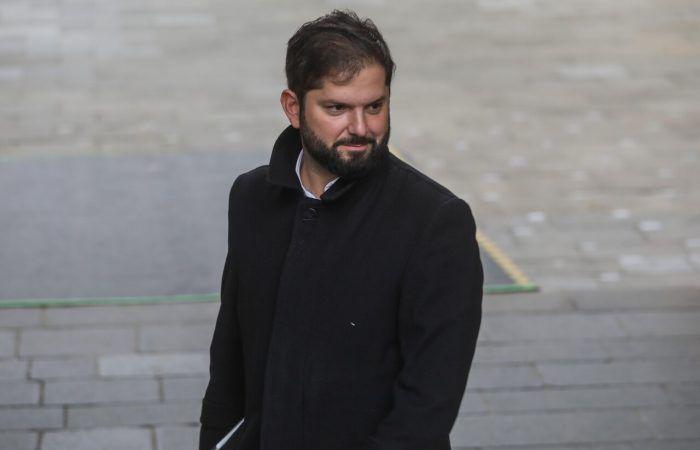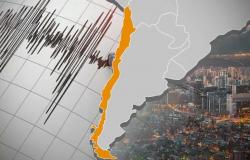President Gabriel Boric began the week with a favorable wind. According to Cadem, his administration reached 36% approval, completing eight weeks of increase, its best record since October 2023. This increase also occurs after having had its lowest mark (24%) two months ago, then of the triple murder of police officers in Cañete. Various political observers highlight that this rise has to do with an almost immovable base of support for the figure of the President, a recognized international leadership and with an electoral climate that has revealed, on the one hand, the disorder of the right and, on the other hand, another, an exhaustion of the opposition’s discursive resources to attack the Government. Matters such as Octubrism, somersaults and poor economic performance do not have the same effect as they did months ago.
“We learned some time ago that Argentina, when installing a military base in the Patagonia region, installed solar panels in Chilean territory. We received an apology from the Argentine Foreign Ministry, but I would like to tell you, very clearly, that borders are not something that can be ambiguous and that it is a basic principle of respect between countries. Therefore, They must remove those solar panels as soon as possible or we are going to do it”.
That phrase, which President Boric used last week at the UNESCO meeting from France, regarding the diplomatic controversy that the country was going through, did not receive any criticism. It was even supported by the opposition. The Republican Party itself, through its party leader Stephan Schubert, appreciated the tone: “It seems good to me that the Government has indicated that it has to withdraw it now and not later when the climate changes, as the Argentine Government had inappropriately indicated.. Representative Flor Weisse (UDI) pointed out along the same lines: “It seems to me that what the President has said is correct and I do think it is good that he raises his tone, because we cannot allow any country, and our brother country, to Argentina, neither.”
The international deployment is a factor that has brought benefits to the President, since, although only 49% of those surveyed positively evaluated the tour of Europe, 73% agree that presidential tours strengthen Chile’s image in abroad. In addition, to this are added the positive aspects under the macroeconomic magnifying glass, such as – for example – the report published by the International Institute for Management Development (IMD) of Switzerland on the World Competitiveness Ranking, in which Chile is ranked 44th and remains the best positioned economy in all of Latin America.
The report, however, warns that the country “slightly lowered its economic performance (international trade, employment and prices),” but highlights the rise “in indicators such as business efficiency, country infrastructure, access to financing and technological infrastructure, among others.” other factors.”
Added to the good international and national indicators that the Government has presented in recent weeks is the consolidation of a political strategy, which the President himself promoted and which leaves him as the natural leader of the single party of the Frente Amplio (FA). . “I invite you, colleagues, to this fourth and hopefully last anniversary of the Social Convergence party, I am encouraging us to think big. I invite you to think big, beyond our militancy, because today we have a responsibility that is greater,” said the Head of State last year outside the headquarters of Social Convergence and Democratic Revolution, on Esmeralda Street, inviting its militancy to form the single party of the Frente Amplio.
A year later, this invitation becomes a reality, since on Friday of this week the unification of the FA parties will be celebrated. With this act, the First President’s group will become the party with the most militants in the country, the largest bench in the Chamber of Deputies and the most preponderant force within the ruling party.
However, the President called on that occasion for his party not to lose its horizon. “Our objective is not the administration, our objective is the structural change of living conditions in Chile, our objective is to continue fighting for greater equality in our country.” The diagnosis is broad in that dimension. The President has not been able to advance his agenda of structural changes for various reasons; however, it is also assessed that his ability to adapt has not diminished his support base on the left.
The specialists’ note on Boric’s rise
The political scientist and executive director of Factoría Pública, Danilo Herrera, warns that “the actions of politicians cannot be defined by what a weekly survey says and much less can the success of a President be measured week by week.” Furthermore, he believes that the evaluation “should be with longer periods and with surveys with more solid methodologies than Cadem.”
Having made the point, Herrera considers it interesting that “despite fluctuations, President Boric consolidated a 30% approval rating despite anything that happens on the public agenda or in the implementation of the government program.” The analyst affirms that, beyond the approval of the administration, there is a positive and particular assessment of the figure of the President, “despite the weekly news that sets the agenda.”
The political scientist defines support as “rigid”, that “not even the tragedy of the three murdered police officers makes it go down too much or leadership like the one shown with the case of Argentina makes it go up significantly.” For Herrera, in two years of administration, “we can say that 30% is the floor and ceiling of this administration, which in times of political distrust is a figure that several leaders in the world would like.”
The IES researcher and professor associated with Faro UDD, Rodrigo Pérez de Arce, notes the rise in the President’s approval, but maintains that he still cannot match what would be his complete support base: the 38% who obtained the Approval in the constitutional plebiscite of September 2022. According to Pérez de Arce, there are various reasons that explain this increase.
On the one hand, the renunciation of the transformative program and the frustrated constitutional change are factors. “That forced the President to renounce his original itinerary and adopt a different tone, even if it was reluctantly and with tensions in his own coalition. “He went from wanting to dismantle neoliberalism to managing what exists, something less attractive to his supporters, but which appeals better to current times.”
The researcher agrees that “the response to climate events and the international tour have taken over the agenda, which allows him to show himself without being mired in internal confrontation.” With that on the table, Pérez de Arce recognizes a gesture on the part of the President, in that “he has reinforced a certain confrontation with José Antonio Kast, which paid off in the second presidential round and could be influencing today.”
One factor to consider is that the public’s attitude towards politics is not the same as in previous years, where there were plebiscites and constitutional processes underway. However, the current electoral environment also plays a relevant role. For the analyst, the fact that the opposition in the midst of electoral negotiations is in disarray, opens up space for Boric to appear. “The right is in a state of immobility that allows the President to move calmly. The municipal negotiation has focused a lot of attention and has not yet shown results; tensions between Chile Vamos and Republicans increase; and a leadership comparable to that of Sebastián Piñera that can organize the card has not yet emerged.”
The director of Studies at Idea País and lawyer from the Universidad de los Andes, Magdalena Vergara, explains that the President’s approval is given by different factors. She agrees with Pérez de Arce regarding the fact of having left aside the agenda of the government program. “He has lowered the intensity of his agenda and has completed the transformations that his government sought to promote, moving from a ‘transformative’ government to one that is ‘administrator of power’, with greater attention to the urgent needs of Chileans,” Vergara indicates. This is added, she says, to the assessment of the international tour and the management of the front systems that affected the country.
The lawyer also adds to the equation the fact that “the country is also rebounding in economic issues, there is greater optimism regarding the future and a certain ‘normalization’ that, although not necessarily thanks to the Government’s management, is undoubtedly They impact you favorably.”
Vergara highlights that we must not forget that the President’s 30% support is stable and remembers that it only dropped months ago when “that group has seen a certain ‘betrayal’ of the President towards his sector, such as what happened with the case of the matapacos dog.” . This fact, it should be noted, also coincided with the murder of the three police officers in Cañete.
The political scientist at the Diego Portales University and candidate for a doctorate in Political Science – Comparative Politics mention – Nerea Palma, warns that this phenomenon is interesting, since the trend in Chile and in the world is that at the beginning of the mandate “there is a period of honeymoon, increasingly shorter, where there is high presidential approval, and from the beginning of the Government to the end, it does nothing but go down.”
With the same warning that Herrera makes, regarding Cadem’s methodological difficulties, Palma maintains that “it is not strange that presidential approval is on the rise” and explains it, like Vergara, by the economic performance, in which it cannot be entrust only the Government with the economic slowdown, as well as a crisis in this area, “but the Government’s management is important,” highlights the academic. And on that level, she maintains, “it seems to me that there is good news in Chile.”
Now, from a political science perspective, with evidence in hand, he points out that “presidential approval is extremely sensitive to economic fluctuations” and, in that sense, the rise is not strange, even more so when comparing this with previous years where the economic situation was different. If the economic aspect shows signs, the level of approval will also show them, ultimately. Now, Palma believes that it is equally important “that there is consistency regarding the promises that the Government itself assumes and, if possible, that it can carry them out or not.”
-
For more analysis and to discover the secrets of politics, join our community +Político, El Mostrador’s bet for those who think that politics is essential for a better democracy. Sign up for free HERE.






